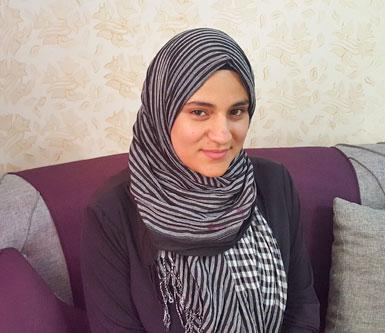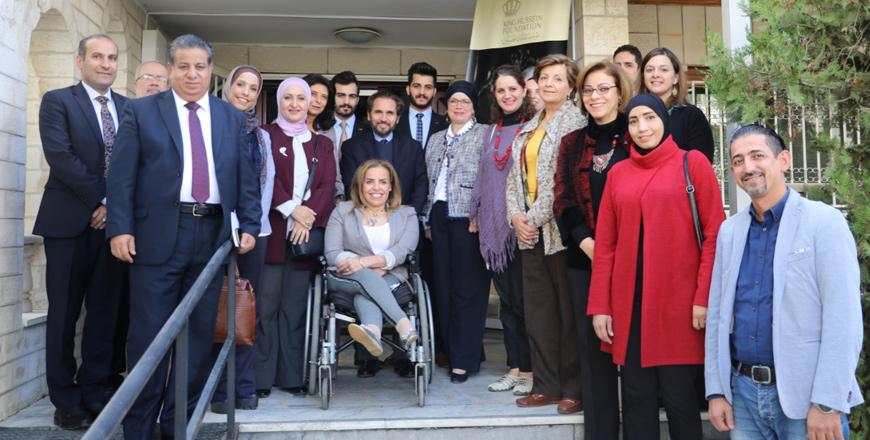You are here
Syrian advocate uses animation to raise awareness on early marriage, gender-based violence
By JT - Nov 29,2020 - Last updated at Nov 29,2020

Nabila, a 24-year-old Syrian refugee, finds her calling in raising awareness of early marriage and gender-based violence through animation (Photo courtesy of CARE International in Jordan)
AMMAN — For Nabila, a 24-year-old Syrian refugee, the question of “why anyone would inflict pain on others” was the trigger behind volunteering with a local NGO working with women victims of violence.
Nabila has been living in Amman with her family of six after fleeing Damascus in 2012. She is an active member of CARE’s Community Committees.
“I started working when I was a little under 18, then I got a volunteering job with a local NGO working with women victims of violence and thought to myself, why would anyone inflict such pain on others?”
“I am not living in a camp and my father supports the whole family and is very encouraging when it comes to what I choose to do. I guess I do not have a tough life after all, but I am a young woman and a refugee trying to build my future and help my community during a difficult time in a global pandemic.”
Nabila passed her Tawjihi (the General Secondary Education Certificate Examination) and, as her family could not afford to send her to a private university, she decided to look for a job. Nabila said she did different jobs for a modest pay, but those jobs helped her to discover her passion and where she needed to develop her skills.
“My first job was with an educational centre, where I had to coordinate trainings for many subjects. I dealt with many people with different personalities, both teachers and students. I was shy and had no experience dealing with the outside world,” she said.
Nabila said that the turning point in her life was when she joined a local NGO. “Listening all day long to stories of refugees and Jordanians seeking support and protection, as a result of different forms of violence, was what influenced my life for many years to come.”
In 2016, Nabila won a scholarship to study business administration and obtained her diploma. “But my passion for working with refugees and women, in particular, did not leave me.”
Nabila explained that, despite the fact that most of the work permits available for Syrian refugees in Jordan are issued to men, she worked hard to start up a small business linking women and youth with employers.
Nabila said she kept engaging with her community all along and worked on building her skills through different trainings to be able to advance discussions on gender-based violence and maternal health in her community.
“Mothers asked me to talk to their daughters after they attended awareness sessions on early marriage and gender-based violence. For me, that was a step closer to success.”
For Nabila, dealing with such sensitive issues should be addressed from an early age and that is why she started looking for ways to talk about those complex matters in a simple and creative manner. “Lectures and awareness sessions become boring sometimes and have limited reach. I thought of animation to help me and others convey our messages, but I had no idea how to do it and no money to produce it.”
She said that her first animation film was produced with the help of friends and female volunteers. Nabila added that she then worked on different films covering topics related to sexual harassment, early marriage and violence. Nabila managed to get support and funding for her initiatives through different programmes by NGOs and UN agencies, in order to continue her work. “Some of these films were screened in refugee camps and host communities, with more than 150 people watching at times. Some of her films were shown in Europe too.”
With CARE’s Community Committees, Nabila said she was able to create an interactive theatre initiative addressing early marriage and inequality. The show was presented in several locations in Amman. With CARE’s support, Nabila said she produced an animated film addressing violence against women.
“The idea was to highlight that we are all responsible and that injustice affecting men at early age can lead to further violence against women and girls later on. We have to address violence against children too,” she said
CARE Jordan has been running community committees in different areas in the Kingdom since 2012 to promote the leadership and engagement of underrepresented communities.
The committees comprise women and men, youth and elders, persons with disability, Jordanians and refugees. Members of the committees are trained in human rights, gender equality and planning community initiatives. CARE supports the committees both technically and financially to carry out awareness initiatives in the community.
“Nabila is a true advocate; I am always amazed at how she can handle discussing gender-based violence with community leaders and refugees with such confidence and ease. She has the skill to rally people, both men and women, around her cause with great zest,” said Sawsan Saadeh, director of the Sustainable Development programme at CARE in Jordan.
“I want to make films and I want to be active in combating violence and inequality. It has been challenging, since there aren’t many opportunities these days, as a result of COVID-19 consequences on everyone.”
Related Articles
AMMAN — Over 400 Syrian women have been trained on human rights and gender through the four Women Leadership Councils (WLCs) established by
AMMAN (UN Communications Group) — A 17-year old woman who came to Jordan four years ago won the first award in her life when she participate
AMMAN — A three-year project titled “You have a right, a choice…claim it!”, aiming to elevate the response to gender-based violence in the K













